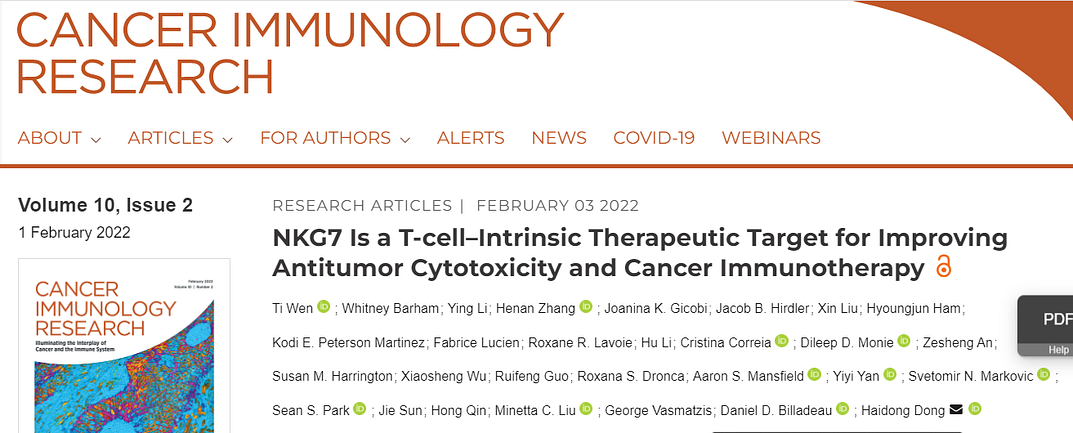Mayo Clinic Cancer Center Blog
By Colette Gallagher
January 11, 2022
Adding messenger RNA, or mRNA therapy improves the response to cancer immunotherapy in people who weren’t responding to the treatment, Mayo Clinic research shows.
Immunotherapy uses the body’s immune system to prevent, control and eliminate cancer.
The study is published in Cancer Immunology Research, a journal of the American Association for Cancer Research.
The phrase messenger RNA and its acronym, mRNA, have become familiar to the public during the COVID-19 pandemic. The mRNA vaccines for COVID-19 work by instructing cells in the body how to make a protein that triggers an immune response against the virus.
MRNA technology has also been of interest to cancer researchers and physicians. One of the major obstacles in cancer treatment is the low response rate in people who receive immune checkpoint inhibitors to prevent an immune response from being so strong that it destroys healthy cells in the body.
“We found that by introducing mRNA in immune cells, it is possible to produce useful proteins to improve their anti-tumor activity without attempting to change the genome itself,” says Haidong Dong, M.D., Ph.D., a Mayo Clinic cancer researcher.
“This approach may have the potential to be used across the spectrum of medicine to pull information gained from single-cell RNA-sequencing into mRNA-based therapy for patients.”
For the study, Dr. Dong and his team produced an immune system protein in the lab ― a monoclonal antibody ― that can detect the protein levels in tumor tissues.
The goal was to determine whether certain people may have appropriate protein levels in their tumor-reactive immune cells as a potential biomarker for this therapeutic intervention.
“Most patients with advanced cancers have not benefited from current immune checkpoint blockade therapy,” says Dr. Dong. “Our study provides a tool to detect this problem and also provides a mRNA-based therapy to fix it.”
Next, the researchers employed new sequencing technology that makes a mRNA-based change of primary immune cells possible.
They identified the target gene in single-cell RNA-sequencing datasets.
Then they performed a functional test to validate the role of the target gene in enhanced immune cell-mediated killing of tumor cells.
The analysis indicated a weak spot of T cells in people who did not respond to immunotherapy.
T cells are white blood cells that play an important role in the immune system. They attack cancer cells and stop the cancer from spreading to other sites of the body.
The researchers developed a mRNA-based strategy to improve their T cell response to immune checkpoint inhibitors in people who weren’t responding to the treatment.
The study models a new translational approach to leverage information gained from single-cell RNA-sequencing studies into mRNA-based therapy for clinical use, according to Dr. Dong.
Future research goals include optimizing the screening test to detect the protein in human tumor tissues.
This will help to determine any correlation with cancer prognosis and responsiveness to immunotherapy and explore a platform of using mRNA for T cell therapy.
“At Mayo Clinic, one way to meet the needs of patients is to offer them something new that they cannot find in other places,” says Dr. Dong. “We are committed to finding options for patients who do not respond to current immunotherapy.”
Funding
This study was funded by Mayo Clinic’s Center of Individualized Medicine’s Immunotherapy with Precision Biomarkers (IMPRESS) and High-Definition Therapeutics programs, Mayo Clinic’s Center for Biomedical Discovery, Mayo Clinic Cancer Center’s David F. and Margaret T. Grohne Cancer Immunology and Immunotherapy Program, the Richard M. Schulze Family Foundation and the Innovation Accelerator Awards program of the Mayo Clinic Office of Translation to Practice (OTP), part of the Center for Clinical and Translational Science (CCaTS).
Originally published at https://cancerblog.mayoclinic.org on January 11, 2022.
ORIGINAL PUBLICATION

NKG7 Is a T-cell–Intrinsic Therapeutic Target for Improving Antitumor Cytotoxicity and Cancer Immunotherapy
CANCER IMMUNOLOGY RESEARCH
FEBRUARY 03 2022
Ti Wen1 , Whitney Barham2 , Ying Li3 , Henan Zhang1 , Joanina K. Gicobi2 , Jacob B. Hirdler1 , Xin Liu1 , Hyoungjun Ham2 , Kodi E. Peterson Martinez2 , Fabrice Lucien1 , Roxane R. Lavoie1 , Hu Li4 , Cristina Correia4 , Dileep D. Monie2 , Zesheng An1 , Susan M. Harrington1 , Xiaosheng Wu5 , Ruifeng Guo6 , Roxana S. Dronca7 , Aaron S. Mansfield8 , Yiyi Yan8 , Svetomir N. Markovic8 , Sean S. Park9 , Jie Sun2,10, Hong Qin11 , Minetta C. Liu8 , George Vasmatzis12, Daniel D. Billadeau2 , and Haidong Dong1,2
Abstract
Cytotoxic CD8+ T cells (CTL) are a crucial component of the immune system notable for their ability to eliminate rapidly proliferating malignant cells.
However, the T-cell intrinsic factors required for human CTLs to accomplish highly efficient antitumor cytotoxicity are not well defined.
By evaluating human CD8+ T cells from responders versus nonresponders to treatment with immune checkpoint inhibitors, we sought to identify key factors associated with effective CTL function.
Single-cell RNA-sequencing analysis of peripheral CD8+ T cells from patients treated with anti–PD-1 therapy showed that cells from nonresponders exhibited decreased expression of the cytolytic granule-associated molecule natural killer cell granule protein-7 (NKG7).
Functional assays revealed that reduced NKG7 expression altered cytolytic granule number, trafficking, and calcium release, resulting in decreased CD8+ T-cell–mediated killing of tumor cells.
Transfection of T cells with NKG7 mRNA was sufficient to improve the tumor-cell killing ability of human T cells isolated from nonresponders and increase their response to anti–PD-1 or anti–PD-L1 therapy in vitro.
NKG7 mRNA therapy also improved the antitumor activity of murine tumor antigen–specific CD8+ T cells in an in vivo model of adoptive cell therapy.
Finally, we showed that the transcription factor ETS1 played a role in regulating NKG7 expression. Together, our results identify NKG7 as a necessary component for the cytotoxic function of CD8+ T cells and establish NKG7 as a T-cell–intrinsic therapeutic target for enhancing cancer immunotherapy.
About authors & affiliations
Ti Wen 1 , Whitney Barham 2 , Ying Li 3 , Henan Zhang1 , Joanina K. Gicobi 2 , Jacob B. Hirdler 1 , Xin Liu 1 , Hyoungjun Ham 2 , Kodi E. Peterson Martinez 2 , Fabrice Lucien 1 , Roxane R. Lavoie 1 , Hu Li 4 , Cristina Correia 4 , Dileep D. Monie 2 , Zesheng An 1 , Susan M. Harrington 1 , Xiaosheng Wu 5 , Ruifeng Guo 6 , Roxana S. Dronca 7 , Aaron S. Mansfield 8 , Yiyi Yan 8 , Svetomir N. Markovic 8 , Sean S. Park 9 , Jie Sun 2,10, Hong Qin 11 , Minetta C. Liu 8 , George Vasmatzis 12, Daniel D. Billadeau 2 , and Haidong Dong 1 ,2
1 Department of Urology, Mayo Clinic, Rochester, Minnesota.
2 Department of Immunology, Mayo Clinic College of Medicine and Science, Rochester, Minnesota.
3 Division of Computational Biology, Mayo Clinic, Rochester, Minnesota.
4 Center for Individualized Medicine, Department of Molecular Pharmacology and Experimental Therapeutics, Mayo Clinic College of Medicine and Science, Rochester, Minnesota.
5 Division of Hematology, Mayo Clinic College of Medicine and Science, Rochester, Minnesota.
6 Department of Laboratory Medicine and Pathology, Division of Anatomic Pathology, Mayo Clinic, Rochester, Minnesota.
7 Division of Medical Oncology, Mayo Clinic, Jacksonville, Florida.
8 Division of Medical Oncology, Mayo Clinic, Rochester, Minnesota.
9 Department of Radiation Oncology, Mayo Clinic, Rochester, Minnesota. 10Division of Pulmonary and Critical Care Medicine, Mayo Clinic, Rochester, Minnesota.
11Division of Hematology and Oncology, Mayo Clinic, Jacksonville, Florida. 12Department of Molecular Medicine, Mayo Clinic, Rochester, Minnesota
Originally published at https://aacrjournals.org












